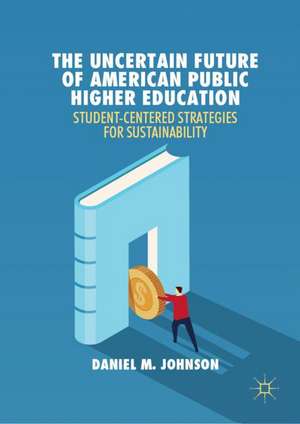The Uncertain Future of American Public Higher Education: Student-Centered Strategies for Sustainability
Autor Daniel M. Johnsonen Limba Engleză Hardback – 3 ian 2019
Preț: 528.30 lei
Preț vechi: 621.53 lei
-15% Nou
Puncte Express: 792
Preț estimativ în valută:
101.09€ • 105.34$ • 83.70£
101.09€ • 105.34$ • 83.70£
Carte tipărită la comandă
Livrare economică 03-17 aprilie
Preluare comenzi: 021 569.72.76
Specificații
ISBN-13: 9783030017934
ISBN-10: 3030017931
Pagini: 234
Ilustrații: XVII, 225 p. 1 illus.
Dimensiuni: 148 x 210 mm
Greutate: 0.44 kg
Ediția:1st ed. 2019
Editura: Springer International Publishing
Colecția Palgrave Macmillan
Locul publicării:Cham, Switzerland
ISBN-10: 3030017931
Pagini: 234
Ilustrații: XVII, 225 p. 1 illus.
Dimensiuni: 148 x 210 mm
Greutate: 0.44 kg
Ediția:1st ed. 2019
Editura: Springer International Publishing
Colecția Palgrave Macmillan
Locul publicării:Cham, Switzerland
Cuprins
1. Introduction.- 2.Tuition Crisis: The Cost and Financing of Public Higher Education.- 3. Seat Time Academic Credit: What Does it Really Measure?.- 4. Tenure: Lifetime Employment in a Fast Changing World.- 5. Campuses: Overvalued, Underused, and Very Costly.- 6. Lectures, Textbooks, Academic Calendar, and Administration: An Agenda for Change.- 7. Duplication of Programs: Where Do We Draw the Line?.- 8. Intercollegiate Sports: Challenges to the Academic Mission?.- 9. Presidential Selection, Salaries, and Moral Leadership.- 10. Student Demographics: The Coming Changes and Challenges for Higher Education.- 11. University Governance: Structures, Roles, and Responsibilities.- 12. Accreditation: How it Works and Is it Working?.- 13. Attacking the Problems: Student-Centered Strategies for Governors, Governing Boards, and University Presidents.- 14. Epilogue: Theoretical Perspectives on Change.
Notă biografică
Daniel M. Johnson is President Emeritus at the University of Toledo, USA. He has also served in senior leadership positions in public higher education in Texas, Alaska, and the United Arab Emirates. www.danjohnsonstrategicleadership.com
Textul de pe ultima copertă
This book addresses the costly non-sustainable policies, programs, practices, and priorities currently driving the tuition crisis in American public higher education. In this era of growing competition among public colleges and universities for more students and higher rankings, their leaders and governing boards have lost sight of student-centered missions in favor of more and greater non-education related amenities, facilities, programs, and practices that have added substantially to the cost of a college degree without increasing its quality. This book is an appeal to all interested taxpaying citizens, public officials, governors, governing boards, and university presidents to take a second look at these costly decisions and begin a new era of placing the higher education needs and interests of students above all. We have created this tuition crisis; now we must solve it.
Caracteristici
Identifies the serious challenges that policy makers and higher education leaders must understand and address to ensure the sustainability of public Higher Education Provides the first in-depth examination of the health and future viability of the US public higher education infrastructure from the perspective of a former university president Offers policy solutions for a diverse range of stakeholders including legislators, state higher education officials, trustees, presidents, donors, and academics
